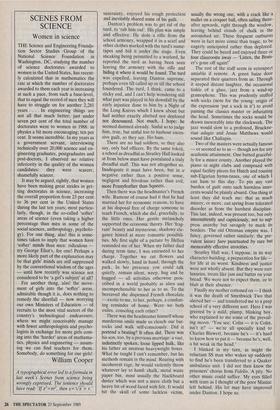SCENES FROM SCIENCE
Women in science
THE Science and Engineering Founda- tion Sector Studies Group of the National Science Foundation in Washington, DC, studying the number of science doctorates awarded to women in the United States, has recent- ly calculated that in mathematics the rate at which the number of doctorates awarded to them each year is increasing at such a pace, from such a base-level, that to equal the record of men they will have to struggle on for another 2,281 years . . . . In engineering things are not all that much better; just under seven per cent of the total number of doctorates went to women in 1988: in physics a bit more encouraging; ten per cent. It seems incredible. In my years as a government servant, interviewing technically over 20,000 science and en- gineering graduates, postgraduates and post-doctors, I observed no relative inferiority in the quality of the women candidates: they were scarcer, shamefully scarcer.
It may be argued, rightly, that women have been making great strides in get- ting doctorates in science, increasing the overall proportion from 23 per cent to 36 per cent in the United States during the last ten years; most particu- larly, though, in the so-called `softer' areas of science (even taking a higher percentage than men in some of the social sciences, anthropology, psycholo- gy). For one thing, alas! this is some- times taken to imply that women have `softer' minds than men: ridiculous — try George Eliot's, for one! Perhaps a more likely part of the explanation may be that girls' minds are still suppressed by the conventional wisdom of the ages — until how recently was science not considered to be 'a girl's subject' at all?
For another thing, alas! the move- ment of girls into the `softer' areas, admirable though it is, does nothing to remedy the shortfall — now worrying our own Ministers of Education — of recruits to the most vital sectors of the country's technological endeavours; where we might conceivably manage with fewer anthropologists and psycho- logists in exchange for more girls com- ing into the `harder' areas of mathema- tics, physics and engineering — assum- ing we can find teachers for them. Somebody, do something for our girls!
William Cooper
A typographical error led to a formula in last week's Scenes from science being wrongly expressed. The sentence should have read: 'If x2 =rtr2, then x=1/Tr x r.'


























































 Previous page
Previous page